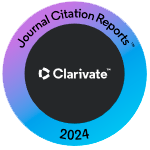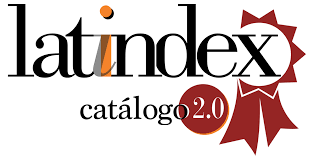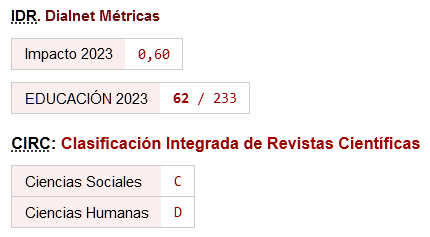Meaningful learning in the development of digital skills. Trend analysis.
DOI:
https://doi.org/10.46661/ijeri.4741Keywords:
Meaningful learning, higher education, ICT, digital skills, teachingAbstract
In the generation of those born in a digital environment, devices are understood as something natural in the way of obtaining instant information. The educational system has adapted and developed new pedagogical models, to combine teaching with the intrinsic characteristics of digital students. In this scenario, meaningful learning provides the educational system with an active model that allows the student to associate the new information with the one they already have, readjusting and rebuilding both in the process. In this context, new technologies act as mediating tools for learning, favoring pedagogical practices in teacher-student relationships. The application of Information and Communication Technologies promote the acquisition of abilities, skills and knowledge for its subsequent professional and social application. Thus, the objective of the study was to identify the scientific publications related to significant learning and the technologies applied in higher education during the period 2000 to 2019. A bibliometric analysis of the scientific literature was carried out. For this, 1,161 documents on this topic were identified. The results of the analysis revealed that scientific productivity has increased since 2010, verifying the deep interest in new technological resources applied to teaching. The main research trends include the impact on students' cognitive processes, motivations, and academic performance.
Downloads
References
Abad-Segura, E., y González-Zamar, M.D. (2019a). Análisis de las competencias en la educación superior a través de Flipped Classroom. Revista Iberoamericana de Educación, 80(2), 29–45.
Abad-Segura, E., y González-Zamar, M.D. (2019b). Effects of Financial Education and Financial Literacy on Creative Entrepreneurship: A Worldwide Research. Education Sciences, 9(3), 238.
Abad-Segura, E., y González-Zamar, M.D., Infante-Moro, J.C. y Ruipérez García, G. (2020). Sustainable Management of Digital Transformation in Higher Education: Global Research Trends. Sustainability, 12(5), 2107.
Abad-Segura, E.; González-Zamar, M.-D.; Rosa, A. L.; Cevallos, M. B. M. (2020). Sustainability of Educational Technologies: An Approach to Augmented Reality Research. Sustainability, 12(10), 4091.
Abad-Segura, E.; González-Zamar, M. D; Luque de la Rosa, A.; Gallardo-Pérez, J. (2020). Gestión de la Economía Digital en la Educación Superior: Tendencias y perspectivas futuras. Campus Virtuales, 9(1), 57-68.
Abeysekera, L. y Dawson, P. (2015). Motivation and cognitive load in the flipped classroom: definition, rationale and a call for research. Higher Education Research & Development, 34(1), 1-14.
Ausubel, D. P. (2012). The acquisition and retention of knowledge: A cognitive view. Springer Science & Business Media.
Cabero-Almenara, J. (2014). Reflexiones sobre la brecha digital y la educación: siguiendo el debate. Inmanecencia, 4(2), 14-26.
Cabero-Almenara, J. Leiva, J. J, Moreno-Martínez, N., Barroso, J y López-Meneses, E. (2017). Realidad aumentada y educación: Innovación en contextos formativos. Barcelona: Ediciones Octaedro.
Cabrera, F. C. (2005). Evaluación, constructivismo y metacognición. Aproximaciones teórico-prácticas. Horizontes educacionales, 10(1), 27-35.
Cano, E. (2005). The portfolio of the university's teaching staff. An instrument for evaluation and professional development. Barcelona: Octaedro-ICE, 1-16.
Castro-Garcia, D., Olarte Dussán, F. y Corredor, J. (2016). Technology for Communication and Problem Solving in the Classroom. Effects on Meaningful Learning. Digital Education Review, (30), 207-219.
Centeno Moreno, G., y Cubo Delgado, S. (2013). Evaluación de la competencia digital y las actitudes hacia las TIC del alumnado universitario. Revista De Investigación Educativa, 31(2), 536.
Choi, G. Y., y Behm-Morawitz, E. (2018). Teach me about yourself (ie): Exploring selfie-takers’ technology usage and digital literacy skills. Psychology of Popular Media Culture, 7(3), 345.
Fernández-Márquez, E., Vázquez-Cano, E., y López-Meneses, E. (2016). Los mapas conceptuales multimedia en la educación universitaria: recursos para el aprendizaje significativo. Campus Virtuales, 5(1), 10-18.
Findlay-Thompson, S. y Mombourquette, P. (2014). Evaluation of a flipped classroom in an undergraduate business course. Business Education & Accreditation, 6(1), 63-71.
Fink, L. D. (2013). Creating significant learning experiences: An integrated approach to designing college courses. Journal of Chemical Education, 82(6), 819-819.
González-Zamar, M.D. y Abad-Segura, E. (2020a). El aula invertida: un desafío para la enseñanza universitaria. Virtualidad, Educación y Ciencia, 11(20), 75-91.
González-Zamar, M-D.y Abad-Segura, E. (2020b) La Realidad Aumentada como recurso creativo en la educación: una revisión global. Escuelas creativas. Creatividad y Sociedad, (32), 164-190.
Gowin, D. (1981). Educating. Ithaca, N. Y.: Cornell University Press.
Herrmann, K.J. (2013). The impact of cooperative learning on student engagement: Results from an intervention. Active Learning in Higher Education, 14(3), 175-187.
Helsper, E.J. y Eynon, R. (2010). Digital natives: where is the evidence? British educational research journal, 36(3), 503-520.
Huber, G. L. (2008). Aprendizje activo y metodologías educativas. Active learning and methods of teaching. Revista de Educación, 59, 59-81.
Imbernón Muñoz, F., Silva García, P. y Guzmán, C. (2011). Competencias en los procesos de enseñanza-aprendizaje virtual y semipresencial. Comunicar, 18(36), 107-114.
Johnson, D.V y Johnson, R. (1991). Learning together and alone. Cooperative, competitive and individualistic learning. Needham Heights, Allyn and Bacon.
Kagan, S. (1994). Cooperative Learning. San Clemente, CA: Kagan.
Lage, M.J., Platt, G. J. y Treglia, M. (2000). Inverting the Classroom: A Gateway to Creating an Inclusive Learning Environment. The Journal of Economic Education, 31(1), 30-43.
Lawrence, J. E., y Tar, U. A. (2018). Factors that influence teachers’ adoption and integration of ICT in teaching/learning process. Educational Media International, 55(1), 79-105.
Little, C. (2015). The Flipped Classroom in Further Education: Literature Review and Case Study. Research in Post-Compulsory Education, 20(3), 265-279.
Marcelo-García, C., Yot-Domínguez, C. y Mayor-Ruiz, C. (2015). University teaching with digital technologies. Comunicar, 23(45), 117-124.
Moreira, M. (2005). Critical meaningful learning. Boletín de Estudios e Investigación.
Novak, J. (1988). Teoría y práctica de la educación. Madrid: Alianza.
O’Flaherty, J. y Phillips, C. (2015). The use of flipped classrooms in higher education: A scoping review. The Internet and Higher Education, 25, 85–95.
Patton, R. y Buffington, M. (2016). Keeping up with our students: The evolution of technology and standards in art education. Arts Education Policy Review, 117(3), 1-9.
Prensky, M. (2009). H. sapiens digital: From digital immigrants and digital natives to digital wisdom. Innovate: journal of online education, 5(3), 1.
Ramsden, P. (2007). Learning to Teach in Higher Education. Londres/Nueva York.
Rodríguez Diéguez, J.L. (2004). La programación de la enseñanza. El diseño y la programación como competencias del profesor. Archidona, España: Aljibe.
Sohrabi, B. y Iraj, H. (2016). Implementing flipped classroom using digital media: A comparison of two demographically different groups perceptions. Computers in Human Behavior, 60, 514-524.
Torres, T. V. (2003). El aprendizaje verbal significativo de Ausubel. Algunas consideraciones desde el enfoque histórico cultural. Universidades, 26, 37-43.
Vázquez Cano, E., López Meneses, E., Fernández Márquez, E., y Ballesteros Regaña, C. (2018). Los nuevos entornos virtuales de aprendizaje permanente (MOOC) y sus posibilidades educativas en ámbitos sociales y educativos. Pixel-Bit : revista de Medios y Educación, 53, 179-192.
Vidal, C. E., Martínez, J. G., Fortuño, M. L., y Cervera, M. G. (2011). Actitudes y expectativas del uso educativo de las redes sociales en los estudiantes universitarios. RUSC. Universities and Knowledge Society Journal, 8(1), 171-185.
Downloads
Published
How to Cite
Issue
Section
License
Copyright (c) 2020 Mariana-Daniela González-Zamar, Emilio Abad-Segura , Luis Jesús Belmonte-Ureña

This work is licensed under a Creative Commons Attribution-NonCommercial-NoDerivatives 4.0 International License.











